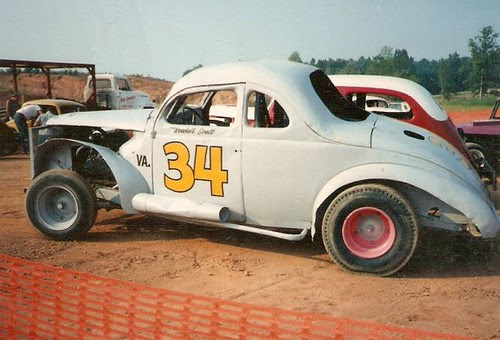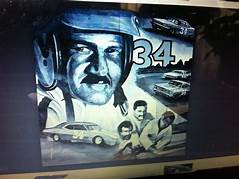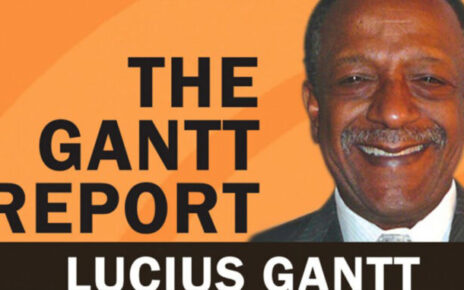Black NASCAR Driver Wendell O. Scott
Wendell Scott & sons Frank Scott (Left),Wendell Scott Jr. (R)


Wendell Scott, the only black driver in NASCAR for virtually all of his career, probably earned more respect than he did money. His career was a constant struggle with low budgets.
The Danville, VA native started racing in 1947. In his first race, he finished third in a borrowed car, won $50 and was hooked. In the next few years he won 128 hobby, amateur and modified races, on the old Dixie Circuit and outlaw tracks. In 1959, Scott enjoyed his best season ever. He won 22 races and captured the Richmond track championship as well as the Virginia State Sportsman title.
Low budget operations such as Scott’s often need a helping hand, and both Earl Brooks and Ned Jarrett have been credited by Scott as being a big help to him during his career. He and Brooks often traveled together. On the family side, Scott often used his sons as members of his pit crew.
Scott bought a year-old Chevrolet from Buck Baker in 1961 and moved up to NASCAR’s Grand National (now Winston Cup) division. In 1963, driving a car he bought from Ned Jarrett, Scott finished 15 in the points.
NASCAR ran a split season then, and the third race of the 1964 season was on December 1, 1963 at Speedway Park in Jacksonville, a one-mile dirt track. Scott beat Buck Baker to become the first black to win on NASCAR’s highest level, a distinction he still holds.
In May of 1964, Scott was down on his luck and almost out of racing when Ned Jarrett set up a deal for Scott. He was able to obtain a Holman-Moody Ford that had been raced the year before in USAC for a dollar. Driving that car, Scott finished 12 in points despite missing several races. Over the next five years, Scott consistently finished in the Top Ten in the point standings.
He moved up to 11th in 1965, was a career-high 6th in 1966, 10th in 1967, and finished 9th in both 1968 and ’69. His top year in winnings was 1969 when he won $47,451.
Wendell Scott, 1999 Inductee
Wendell Scott Followed His Dream To Race Written by Ray Everett 12/3/08
Like many of the early NASCAR drivers, Wendell Scott started out hauling moonshine in a souped up car he maintained himself. Scott was a clever entrepanuer, opening a taxi service in his native Danville, Virginia to shuttle the local residents around town by day, then using the cab under the cover of darkness to bring them the white lightning they were thirsty for.
With his popularity among the moonshiners growing as word of his driving ability spread through the mid Atlantic region, Scott began entering races at local dirt tracks throughout Virginia and North Carolina in 1952. He tasted success only one month into his driving career, winning his first race on the red clay half mile in Lynchburg, Virginia at the age of thirty.
Determined to move up in the sport of stock car racing, Wendell Scott traveled the south during segregation, showing up at NASCAR events with his number thirty four ready to race. He was turned away from many tracks, told by speedway personnel that he would not be able to compete due to the color of his skin. Encountering signs at restrooms, water fountains and restaurants that read “White Only” was a common occurance for Scott, who never seemed to let it bother him. “I expected all of that,” he said of his trials to become a NASCAR driver in segregated America.
Wendell Scott was issued a NASCAR license for the first time and allowed to compete at the old Richmond Speedway in Virginia, either in 1952 or 1953. NASCAR is not certain of the exact date but believes it to be 1953. Record books indicate that Scott went on to compete in four hundred ninty five Grand National and Winston Cup – known today as the Sprint Cup Series – events over thirteen seasons and collected $180,814 in purse winnings. He is credited with one NASCAR win, a controversial race held on December 1, 1963 in Jacksonville, Florida. Buck Baker was flagged the winner and celebrated in victory circle after Scott had passed Richard Petty, who was nursing a damaged car, for the lead with twenty five laps remaining. Scott was awarded the victory hours after the race was completed and left the track that day without the winners trophy. Many said NASCAR would not allow him to celebrate in victory lane because he would have had to kiss a white beauty queen.
Scott retired from NASCAR racing in 1973 and returned to driving the short tracks of Virginia and the Carolina’s for a few more years, entering select events when circumstances would allow. Later in life he would become dissatisfied with his racing career, firmly believing he hadn’t the opportunity to showcase his talent in competitive equipment. Scott worked diligently throughout his career, without success, to obtain factory support and major sponsorship for his racing efforts. Ned Jarrett and Richard Petty were among his strongest supporters
“I was a black man. They wasn’t going to help a black man. That was all there was to it,” Scott once said in summing up the prejudice his career suffered.
A hard working and humble man, Scott struggled tremendously to raise seven children while running the family auto repair business and pursuing his racing dream. He was popular among NASCAR race fans, taking the time one sunny afternoon in 1973 at the North Carolina Motor Speedway in Rockingham, North Carolina to accommodate this writers request for an autograph and conversation of the days events.
Greased Lightning, a movie detailing the history of Scott’s career, was produced in 1977 and starred Richard Pryor as Wendell Scott. Scott worked with the producers and was promised royalties, but never received any.
Wendell Scott passed away on December 23, 1990 at the age of sixty nine.
A member of several state and regional halls of fame, Scott was inducted into the International Motorsports Hall Of Fame at Talledega in 1999 and the National Motorsports Press Association Hall Of Fame at Darlington in 2000.
It is no doubt Wendell Scott was a genuine racer who accomplished great things in the face of adversity. He was a man ahead of his time, possessing a burning desire to succeed in the sport he dearly loved. Let his path and message serve as an example to us all.
Racing Pioneer Wendell Scott by Tony McClean Today we take a look at one of the first African-Americans to thrive and win on the NASCAR circuit. You may already have heard of the name of Wendell Scott if you’re a fan of comedian-actor Richard Pryor. Back in 1977, Pryor starred in “Greased Lightning”, a movie depicting the life of Mr. Scott.
Scott, who endured severe discrimination during his days as a driver, raced throughout the 1960s and early 1970s. He finished sixth in the Winston Cup standings in 1966 with 21,702 points. Only 1,250 points separated Scott and third-place finisher Richard Petty, who is arguably the greatest driver ever.
Born Aug. 28, 1921, Scott was from Danville, Virginia’s “Crooktown” section. His first driving job was as a taxi driver. Later he hauled illegal whiskey, an occupation that called for skills as both a high-performance mechanic and a fearless driver.
Early on, blacks were barred from many major races. In the 1920s black drivers tried to arrange racing circuits. But the prize money was meager at best. Nevertheless, Scott set his sights on breaking into organized racing. “There were just a few Blacks attending races then,” Scott was quoted as saying.
“Most of the time me and a friend were the only two Blacks in the stands. He’d often ask me if I’d have the nerve to get out there and run. I’d tell him, ‘shucks, yes,’ I could do it.” Scott started racing at the Danville Fairgrounds Speedway.
On February 10, 1952, Joie Ray started 25th in the Daytona 500 course in his Henry J. Ray went on to finish 51st that day and is recognized as being the first African-American driver to start a NASCAR sanctioned race.
Scott would go on to win 120 races in lower divisions and in 1959 won state championships in his classes. In 1961 he was able to pull together enough money to field a car on NASCAR’s top-level Grand National circuit, later renamed the Winston Cup series.
Enduring persistent, sometimes brutal discrimination, Scott raced in nearly 500 races in NASCAR’s top division from 1961 through the early 1970s. Racing on a shoestring, he finished in the top ten 147 times.
On December 1, 1963, he won his only major race, a 100-mile event on a half-mile track in Jacksonville, Florida, but Scott was denied the opportunity to celebrate in Victory Circle.
NASCAR officials said a scoring error was responsible for allowing another driver to accept the winner’s trophy. Scott doubted that explanation. “Everybody in the place knew I had won the race,” he said years later, “but the promoters and NASCAR officials didn’t want me out there kissing any beauty queens or accepting any awards.”
In 1973, he suffered severe injuries in a race at Talladega, Alabama. He raced only a few times afterward. Wendell Scott passed away in 1990. But the legacy of Scott hasn’t been forgotten.
Even to this day, the spirit of the ex-cab driver from Virginia remains.
Note: The African-American Registry and NASCAR.com contributedAnthony McClean is a Researcher/Reporter/Writer for ESPN and Black Athlete Sports Network. You can also hear his sports commentaries every Saturday morning at 11:00 a.m. on “Sport Talk” on WCLM-AM 1450 in Richmond, Virginia (www.wclmradio.com).
Wikipedia – Wendell Oliver Scott
Wendell Oliver Scott was an American stock car racing driver from Danville, Virginia. During most of his career he was the only African-American driver in NASCAR.
He initially worked as a taxi driver, and learned to be a mechanic in the Army during WW II. After returning home he worked as a mechanic and in the evenings sometimes delivered moonshine.
Scott began racing in 1947 on local track in hobby, amateur and sportsman classes. He met with gradually increasing success. In 1959 he won 22 races, the Richmond track championship, and the Virginia state sportsman title.
In 1961 he moved up to the NASCAR Grand National (now Nextel Cup) division. In the 1963 season, he finished 15th in points, and on December 1, 1963 he won a race at Jacksonville, Florida on the one mile dirt track at Speedway Park — the first and to date only top level NASCAR event won by an African-American. He continued to be a competitive driver despite his low-budget operation through the rest of the 1960s.
He was forced to retire due to injuries from a racing accident at Talladega, Alabama in 1973. He achieved one win and 147 top ten finishes in 495 career Grand National starts.
The movie “Greased Lightning” starring Richard Pryor was a loose biography of Wendell Scott.
The Lost Trophy Among all the trophies Wendell Scott won in his racing career, there is one that will forever be his legacy to the sport he loved.
It isn’t much to look at, just some off-color wood with no plaque or varnish or glitzy, gimmicky metalwork. It pales in comparison to the gleaming, brightly polished trophies is sits among.
But that piece of wood, battered and beaten and sorry compared to the others, is the symbol of Scott’s greatest day as a racing driver. It was Dec. 1, 1963, the day he won a NASCAR Grand National event in Jacksonville, Fla. Scott remains to this day the only black driver to have won a Grand National (now Nextel Cup) Series event in NASCAR’s 58-year history.
During the 42 years since Scott earned his victory — which, given the times and the area in which it occurred was not celebrated as victories always have been, in Victory Lane with a trophy queen and photographers — no black driver has even been close to accomplishing the same feat.
Randy Bethea shocked the NASCAR world in 1973 by knocking Darrell Waltrip off the pole at the Nashville Fairgrounds Speedway, but that was in a Late Model Sportsman event, not Grand National. Willy T. Ribbs, one of the finest road racers in the world, tried out a stock car at Daytona but never qualified for the 500.
That’s pretty much been it, in terms of black names in Cup racing on the driving side since Scott won at Jacksonville in 1963. Bill Lester has driven in Craftsman Truck races since 2000.
Scott, who died in 1990, was from Danville, Va., just inside the state line from North Carolina. It was an area rich in history for stock car racers, and also an area where it was not unheard of to run illegal whiskey from town to town in souped-up cars.
Scott was a taxi driver who graduated to running moonshine and eventually to racing stock cars. For any of those jobs, one had to be a master mechanic and a pretty nifty driver. In 1959, at the age of 38, Scott won the Virginia State Sportsman championship. Two years later, Scott was able to field a car for the Grand National Series. In nearly 500 Grand National races, he was in the top 10 an amazing 147 times.
Competing nose-to-nose with legends
Considering what Scott had to go through to compete in those Grand National races, it is even more amazing. The South in the early 1960s was still in the grips of Jim Crow, Bull Conner and the sort of segregation that we today know only through history books. Even on the day he won in Jacksonville, the pervasive attitude of Southern society at the time prevented him from receiving his due. “Everybody in the place knew I had won the race,” he said years later, “but the promoters and NASCAR officials didn’t want me out there kissing any beauty queens or accepting any awards.”
Despite racing on a budget that made shoestrings seem expensive, Scott made it work. In 1966, he was a career-best sixth in the points. Through it all, he held his own and competed nose-to-nose with many of the legends whose achievements the present-day NASCAR is built upon.
His driving career ended for all intents and purposes in 1973, when he sustained three cracked ribs, a lacerated arm and a cracked pelvis in a massive 21-car pileup at Talladega Superspeedway. Ramo Stott’s blown engine nine laps into the race that day caused the crash, and Scott’s Mercury was credited with 55th place (out of 60 starters).
He died Dec. 22, 1990, after a long battle with spinal cancer, some 27 years and 21 days after the biggest victory of his career. He was later elected to the International Motor Sports Hall of Fame, located, ironically, in Talladega, Ala.
“I’m so glad we never gave up,” said Scott’s widow Mary. “When Ned Jarrett and all of those old drivers came to Scott’s funeral, they told us he had the respect of all the drivers. I’d say all of those older guys learned to like him and respect him. They knew he was a genuine person and he stood for what he believed. He didn’t give up.”
Scott’s son, Franklin, said that his father had earned his respect by competing with the best in the business and never giving an inch despite the fact that he was at a huge disadvantage in both finances and resources. As his father’s crew chief, Franklin didn’t get to see his dad win at Jacksonville, having stayed behind to play in a high school football game that weekend.
“I’ll never forget it,” Franklin Scott said. “I was playing football that weekend and I was home and got on the bus and a guy on the bus, a friend of mine who was a real joker, said, ‘Your dad won a race today.’ I said, ‘Yeah, sure.’ And he said, ‘No, your old man won today.’ I still didn’t believe him.”
Wendell had won the race, by two laps over Buck Baker, but NASCAR waved the checkered flag over Baker and awarded him the trophy. Hours later, NASCAR officials told him he really did win the race. “My dad went off then,” Franklin Scott said. “He said, ‘Give me my damn money.’ Buck got the real trophy. The thing we got was junk. They gave us a trophy about a month later at Savannah. But it wasn’t the real thing.”
While it didn’t make much sense to Franklin at the time, it did later. It was racism, pure and simple. “I guess it all was just a sign of the times.” he said. “The opportunity for a black man to race just wasn’t there. He overcame many hurdles and he never let it faze him to the point where it made him hostile. I don’t know how he was able to do that. It was difficult for me when I would see a lot of the things I wouldn’t understand why my daddy didn’t put them in the wall. I thought he was afraid. He wasn’t afraid … he was thinking about the next race.”
While there were many similar incidents over the years, one stands out to Franklin. In 1962, Jack Smith watched Wendell shatter his track record at Savannah, Ga., in a car Scott bought from Jarrett. Smith marched over to Scott’s pit and told him that he would drive right through Scott’s car that night in the race. Scott finished second to Jarrett that night, and though Smith didn’t apologize to Scott, Joe Weatherly did. “Joe Weatherly came to our pits after the race,” Franklin remembered. “He said, ‘Wendell, I just came to apologize for the rest of the stupid SOBs.’ ”
According to Franklin Scott, Smith kept at it until one day Wendell had enough. “He [Smith] had wrecked us up at Winston-Salem and my daddy had had it with him,” Franklin recalled. “On the pace lap he pulled up beside Daddy and started pointing his finger at him. We didn’t know it but Daddy had his gun with him and he pulled it out and pointed the gun back. We never had trouble with Jack again.”
It is hard to imagine something like that happening today. Because of men like Wendell Scott and Randy Bethea, black drivers are getting a chance to prove themselves in the arena of competition. NASCAR and corporate America have awakened to the fact that there are more Wendell Scotts out there, and they are bound and determined to find them.










